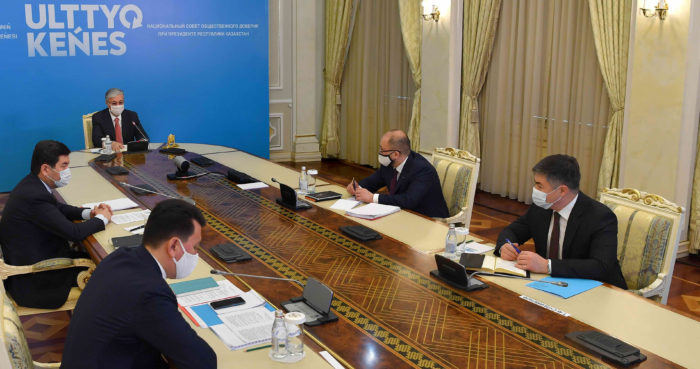NUR-SULTAN – Kazakhstan is planning on increasing women’s representation up to 30 percent in the management of companies with state participation, said Kazakh President Kassym-Jomart Tokayev during the fourth meeting of the National Council of Public Trust, the Akorda press service reported.

Tokayev noted that women are still underrepresented in top management. Women currently hold only five to seven percent of top management positions.
“This situation does not allow the country to tap into the full potential of women, who make up more than half of the country’s population (51.5 percent of the country’s population are women). The members of the council have worked on this issue and have proposed the introduction of a mandatory quota to increase the proportion of women in management bodies and companies with state participation to up to 30 percent. I believe that we must begin the gradual implementation of this initiative,” said Tokayev, noting that government quotas will make business careers more attractive for women.
More than 55 percent of civil servants and social workers are women, he added.
“At the same time, 22 percent of maslikhat (local representative bodies) and parliament deputies are women and 47 percent of judges are women. For the first time in the country’s history, a woman assumed the office of governor (Gulshara Abdykalikova, Kyzylorda Region governor). According to experts, Kazakhstan is leading among post-Soviet states in terms of women’s proportion in public administration and government,” he said.
Addressing the council members, Tokayev also noted the important role of the council, which was established in July 2019 by Tokayev to better facilitate public input in the formation of national policies. Since the establishment of the council in 2019, Tokayev held 24 meetings with its members, and seven laws were adopted.
He said that despite the pandemic, the council continued its activities and has implemented several important initiatives.
“Citizens should see and feel the real results of the state policy not in some distant future, but in the near future. It is necessary to understand that international ratings, despite their importance, no longer impress citizens and do not impact their social well-being,” said Tokayev.
He emphasized the need to continue reforms, such as the introduction of rural akims (mayors) and greater involvement of women and youth in the parliament and local representative bodies.
Labour Migration
Speaking about internal migration, particularly from southern parts of the country to the north, Tokayev suggested doubling the amount of assistance from current 97,230 tenge (US$226) to 194,460 tenge (US$452), to address multiple problems citizens face when moving.
“This is a multifaceted process, which has positive aspects such as enhancing qualifications, gaining new skills, accumulating capital to open business and adapting to a different social and cultural environment. The state will therefore do its best to fulfill the potential of Kazakh citizens, including those migrating to do labor,” said Tokayev.
New housing, infrastructure and various social facilities are being built to meet the needs of people relocating across the country, he added.
Tokayev told the council to improve the “Serpin” and “With Diploma to Village” national programmes. The Serpin programme is designed to encourage young people from southern parts of the country to move to northern and eastern parts, while the second programme is aimed at attracting young people to work in rural areas.
Education
The development of digital infrastructure in schools and provision of schoolchildren with computers amid the coronavirus pandemic that forced kids to study from home were also among the topics brought up by Tokayev.
“The results of influential international studies show that our schoolchildren have not yet developed their reading literacy skills to the proper level. Therefore, encouraging a culture of reading and developing reading literacy should become one of the priorities in Kazakh schools. Children should grow their interest in reading and learning the world through books from a young age. And the library should serve as a guide to the fascinating world of books,” said Tokayev.
He also suggested the development of a national monitoring mechanism, dubbed the Child Welfare Index, in an effort to enhance protection of children’s rights. This, according to him, will allow for the monitoring of the effectiveness of national policies in this area.

